POP UP Organizers' Manual

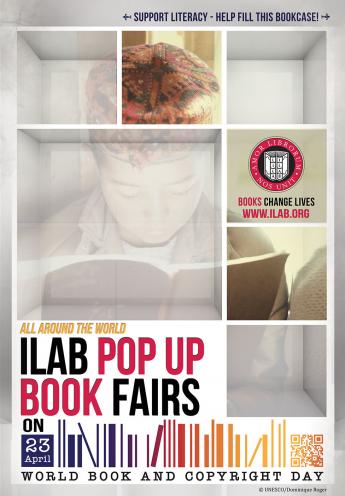
ONCE AGAIN IN 2016
SPEED DATING FOR BOOKLOVERS ACROSS THE WORLD
What is World Book and Copyright Day?
“The 23rd of April is a symbolic date for world literature. It is on this date in 1616 that Cervantes, Shakespeare and Inca Garcilaso de la Vega all died. It is also the date of birth or death of other prominent authors, such as Maurice Druon, Haldor K. Laxness, Vladimir Nabokov, Josep Pla and Manuel Mejía Vallejo.
It was a natural choice for UNESCO's General Conference, held in Paris in 1995, to pay a world-wide tribute to books and authors on this date, encouraging everyone, and in particular young people, to discover the pleasure of reading and gain a renewed respect for the irreplaceable contributions of those, who have furthered the social and cultural progress of humanity. In this regard, UNESCO created the World Book and Copyright Day….
23 April was first proclaimed as World Book and Copyright Day by UNESCO in 1995. The Day is celebrated by a growing number of partners and since its launch has shown itself to be a great opportunity for reflection and information on a significant theme.
It is observed by millions of people in over 100 countries, in hundreds of voluntary organizations, schools, public bodies, professional groups and private businesses. In this lengthy period, World Book and Copyright Day has won over a considerable number of people from every continent and all cultural backgrounds to the cause of books and copyright. It has enabled them to discover, make the most of and explore in greater depth a multitude of aspects of the publishing world: books as vectors of values and knowledge, and depositories of the intangible heritage; books as windows onto the diversity of cultures and as tools for dialogue; books as sources of material wealth and copyright-protected works of creative artists. All of these aspects have been the subject of numerous awareness-raising and promotional initiatives that have had a genuine impact. There must nevertheless be no let-up in these efforts.” UNESCO World Book and Copyright Day website.
In 2016 ILAB affiliates throughout the world will join with UNESCO to celebrate the power and diversity of the book. Join us!
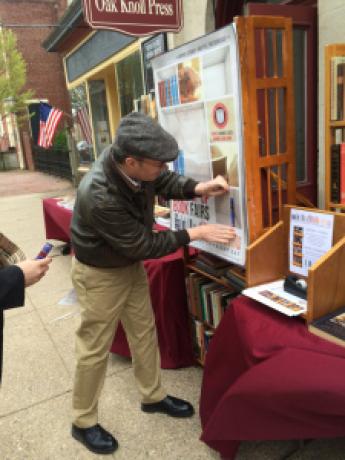
Why is ILAB organising Pop Up Book Fairs on World Book and Copyright Day?
On April 23 next year ILAB affiliates across the world will promote the antiquarian book trade’s great contribution to the promotion and preservation of a very significant part of the world’s culture - rare books and print on paper. Our role is not well recognised outside our circle despite its significant. Unfortunately due to hefts from libraries that have taken place in Italy in recent years much of the publicity we have received of late has been quite contrary to what we stand for and what we do. We need to redress this and explain to the world who we really are and what we offer.
Next April the 23rd many member nations of ILAB will be holding Pop Up Book Fairs. Pop Up Book Fairs are quick book fairs, often quite small, in all sorts of locations, appealing to many different people but all fairs will have two things in common: they will showcase great books and other works on paper and will raise funds for UNESCO’s literacy programme.
Each country and national association differs. ILAB is well aware of this and we are not asking you to do something that is not suitable for your country or region. However we felt it helpful to give some guidelines which might assist.
Please let us know if we have missed something or have not answered one of your questions.
Practicalities
1. Select a venue
Points to consider:
There are many types of venues that would work well as a location for a Pop Up Book Fair. It is important that these Pop Up Fairs are a low or no cost event to enable all ILAB Affiliates to take part if they want to. Ideally the cost to dealers to exhibit will be very small and here will be no need to charge the public an entry charge at all. We are not trying to hold mini versions of our traditional large fairs – the Pop Up Fairs are meant to be something different.
The place you choose to run your region’s fair is limited only by the imagination but might be one of the following:
A location with high foot traffic: a railway station, an upmarket mall, a major library foyer, a central post office foyer etc.
A location with prestigious connections: These types of venues have the advantage of a built in audience if the fair is organised in cooperation with the occupants. Although these venues are not high traffic they can provide an opportunity for ILAB members to connect with an important or powerful group within the community who might not be collecting books – yet! Examples of such a venue might be an upmarket car dealership; an association with an opera, a theatre company, the foyer of a cinema, a hotel, a bank, or of any professional or cultural organisation; a business person’s professional association rooms etc. Many of these places seek suitable events for their groups and an elegant showing of rare books by some of the world’s best book dealers could be perfect for their group.
A very unusual location that will generate interest and attract people or connect with a different audience: All sorts of locations can work and this one may not bring in huge sales but if communicated effectively will get publicity. One of the Pop Up Fairs will be held in country Australia in a woolshed with possibly (still early days yet!) an accompanying concert. Unexpected and interesting! Sure to catch the media’s attention!
An antiquarian bookshop: A very successful Pop Up Fair could be held on the premises of an ILAB affiliates shop. Invite a few other dealers, get some tables, find a prominent place for the “symbolic bookcase” (see item 3 below), publicise and you have the makings of an excellent fair. This venue is likely to be easy and inexpensive to organise and has the advantage of bringing people into a bookshop. It is unexpected and quirky which will give some media appeal and it underlines how well the book trade works together. How many other business competitors in other commercial sectors would do this?
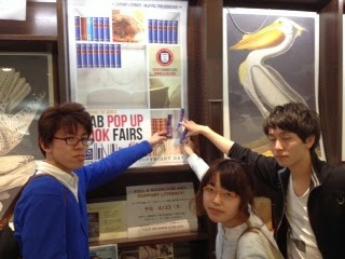
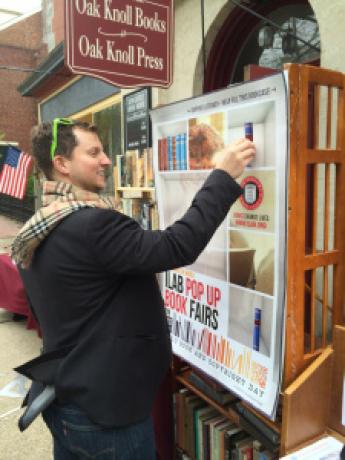
2. Invite your colleagues to exhibit
A Pop Up Book Fair does not need to be large – even two or three booksellers can get together, invite their customers and celebrate what the antiquarian trade represents and is. The key to a successful event is to do something a little different and to let people know about it!
When looking at the venue and thinking which of your colleagues might take consider how many tables you can comfortably fit into the venue? Is there good access? Are you able to put signage up?What sort of stock and how much stock should exhibitors bring? ILAB is about rare and special books and bearing in mind that is likely a dealer will only have one table it is important that rare and special stock is shown. Australian dealers have had the experience of a fair where we were asked to bring only 10 items. We knew we would be judged by this and the standard was high but the variety was also great. Most dealers sold very well.
Pop Up Fairs are by definition a book fair that just suddenly appears. Dealers need not bring much stock. The stock they bring might fit in a box or carry-on bag. It is up to you whether or not you give guidelines regarding the amount of stock however sometimes dealers are daunted by the enormity of the work required to prepare for a fair and if assured that the number of titles required is not necessarily large this may encourage participation. In any case it is worthwhile reminding all exhibitors they will only have a table (good idea to send them the measurements of the table) and a very short time to set up.
Pop Up Fairs are events you can make money at, but even if you don’t, a few very high quality well displayed books will speak volumes about your business and will very likely win you future customers. April 23 is about showcasing rare books and the people who provide them. Book collectors and librarians have fewer opportunities to meet with booksellers – many booksellers are on-line and open shops are far fewer in number. We believe that some members of the public who visit the Pop Up Fairs will likely not be aware of our traditional more formal book fairs or possibly even that collecting books can be so interesting and fun! One of the aims of the Pop Up Fairs on April 23 is to give these people an opportunity to meet see special books, meet dealers and establish a personal relationship.
3. Fill a Bookcase to Fight Illiteracy! Fundraising for UNESCO Literacy Program
The ILAB Pop Up Book Fairs will be more than just fairs, they will also be an avenue for raising money to fight illiteracy throughout the world. What could be closer to the interests of all ILAB affiliates than literacy? What is more appropriate than to enable as many children [and adults] as possible throughout the world to read books? Book collectors start as book readers! If we are concerned about the future of the book and younger generations of collectors, we must start at the very beginning. The UNESCO program to fight illiteracy is the most powerful worldwide partner we could have.
How to raise money? The ILAB Pop Up Fairs start their day with an empty “symbolic bookcase” in the form of a poster positioned at the entrance or in another very visible position. Colleagues and customers are offered the opportunity to "buy" a “symbolic book” to fill the bookcase and thereby donate money to support the UNESCO projects. We also encourage booksellers to invite other businesses or institutions in their community to buy ” symbolic books”. The name of the donor may be written on the “symbolic spines” if the donor would like. The images of the “bookcases”, with the “symbolic books” attached will be visible worldwide via the ILAB website and the names of the donors mentioned if they choose this option.
Donate and fill the bookcases! The “bookcases” are large posters featuring a picture of an empty bookcase. On these posters pictures of books will be fixed. ILAB will provide each Pop Up Book Fair with posters showing the empty bookcase and images of spines of books. These images of spines, or “symbolic books”, will be “sold” to visiting members, companies, booksellers – whoever will buy them. The spines will be colour coded – each colour representing a particular donation. An example might be $10/Euros/Pounds will buy a book for a 10 year old this book will be represented by a green spine. A donation of $150 might buy a set of books for a school library represented by a collection of spines coloured gold etc. As these “symbolic books” are "bought", “symbolic bookcases” fill and across the world more and more money is raised for UNESCO’s literacy program.
It is important that the ”symbolic bookcase” is strategically placed. Its position needs to be very prominent – ideally at the front of the Pop Up Fair so that everyone attending will have to walk past it. At each book fair an extra table (and chair/s) for the “symbolic books” to be displayed on needs to be arranged. This table needs to be positioned in a central and very obvious place. Behind, or beside this table, there should be the display of the poster showing the empty bookcase. The poster will need to be mounted on a wall, displayed on a backing board on large artist’s easel or attached to a partition or free standing backing board.
Appoint a volunteer or volunteers to run the UNESCO symbolic “book sale”. This person will need to understand what the project is about and be prepared to approach visitors and ask them to buy a book. She or he will be making the sales of the “symbolic books” and will be in charge of a float, able to accurately record credit card numbers, write receipts etc.
Appoint a volunteer to bank the UNESCO funds after the event. Details of how to remit the funds to
UNESCO will be provided closer to the time.
Appoint a person to take photos and upload or email them to ILAB website editor, Barbara van Benthem during the Pop Up fair. You don’t need a professional camera. Pictures taken with an iPhone or iPad will be sufficient.
Alert the local media – template of a press release and advice on methods to send it out will be available from ILAB
Ask each bookseller to send out a notice about the ILAB Pop Up Book Fair to their mailing list – ideally at least 3 times over the two months prior to the fairs. ILAB will provide templates for each of these.
Send personal invitations to the local librarians, museum curators and directors, book page editor in the local media, senior business, legal and medical professionals – see publicity sheet for more ideas.
Social Media – involve as many of your support team and ask colleagues to blitz their social media outlets.
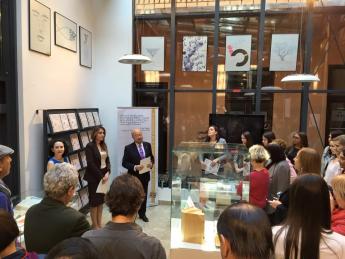
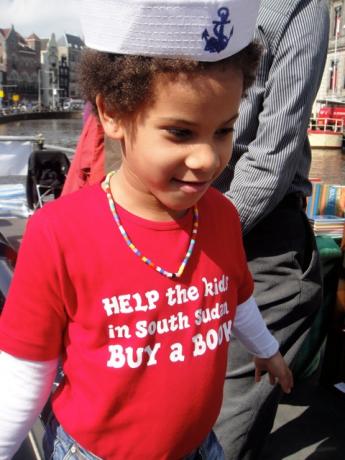
4. Publicity
A key to a successful World Book Day will be publicity. ILAB will be providing real time coverage of the event via the ILAB website, Facebook and Twitter. The day and each fair will all be promoted using the ILAB mailing list before the day. Each Pop Up Organiser will be provided with a template press release that they can use to fill in their own details and send off to their local media. ILAB will also contact some of the world press. If you have contacts in the media that you can put us in touch with we would be grateful to hear.
We ask that at each Pop Up Fair someone is appointed to keep in touch with ILAB by uploading pictures, tweeting or emailing Barbara van Benthem so that she can add real time statistics to the ILAB web presence. We will be seeking information about everything and anything – for example about the number of “symbolic books” sold, amount of money raised, information about some of the books on display, stories about the booksellers, or whatever you care to send us. It is all useful!
5. Signage
Exterior signage. Do you need signs outside the venue to direct people to your venue? Can these be made up from inexpensive materials by one of the booksellers?
Make signs for each exhibitor: In the interests of keeping this a low budget grass roots event we have found it works well to print each bookseller’s name on an A4 piece of paper, This can then be slipped into a mylar sleeve which gives a glossy finish. The signs are then displayed on a book display stand on the exhibitor’s table. This method is cheap and easy and at the end the mylar sleeves can be reused and the stands returned to the bookseller who lent them.
6. Logistics
Tables and chairs: Each exhibitor will require a table and two chairs. Where will you get these? What will the cost be? Who is in charge of making sure the right number is there on the day?
Table cloths: Will you ask each exhibitor to bring their own or provide table cloths that are uniform in colour and size?
Wrapping – bags and brown paper: Ask dealers to bring their own wrapping materials.
7. Information and Support
ILAB Committee member Sally Burdon and ILAB Website and Publicity Manager Barbara van Benthem are available by email or phone for any questions you might have. Sally is located in Australia and Barbara in Germany so whenever you have a question or need help one of them is likely to be awake and at work!
Sally Burdon: Books@AsiaBookroom.com and Barbara van Benthem: editor@ilab.org
GET INSPIRED!
JOIN US AGAIN ON 23 APRIL 2016!
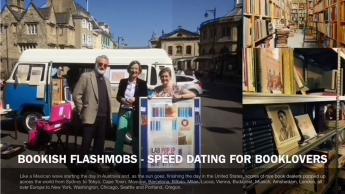
***
THE INTERNATIONAL LEAGUE OF ANTIQUARIAN BOOKSELLERS (ILAB) is the umbrella organization of the professional rare book trade uniting 22 national associations and around 2000 rare book dealers in 34 countries worldwide.
FOR MORE INFORMATION visit ilabpopupbookfairs.blogspot.de and www.unesco.org/new/en/wbcd.
CONTACTS: Sally Burdon - Sally@AsiaBookroom.com | Barbara van Benthem - editor@ilab.org
February 2016 – For immediate release. Pictures: ILAB, UNESCO, the Organizers, Wikipedia
